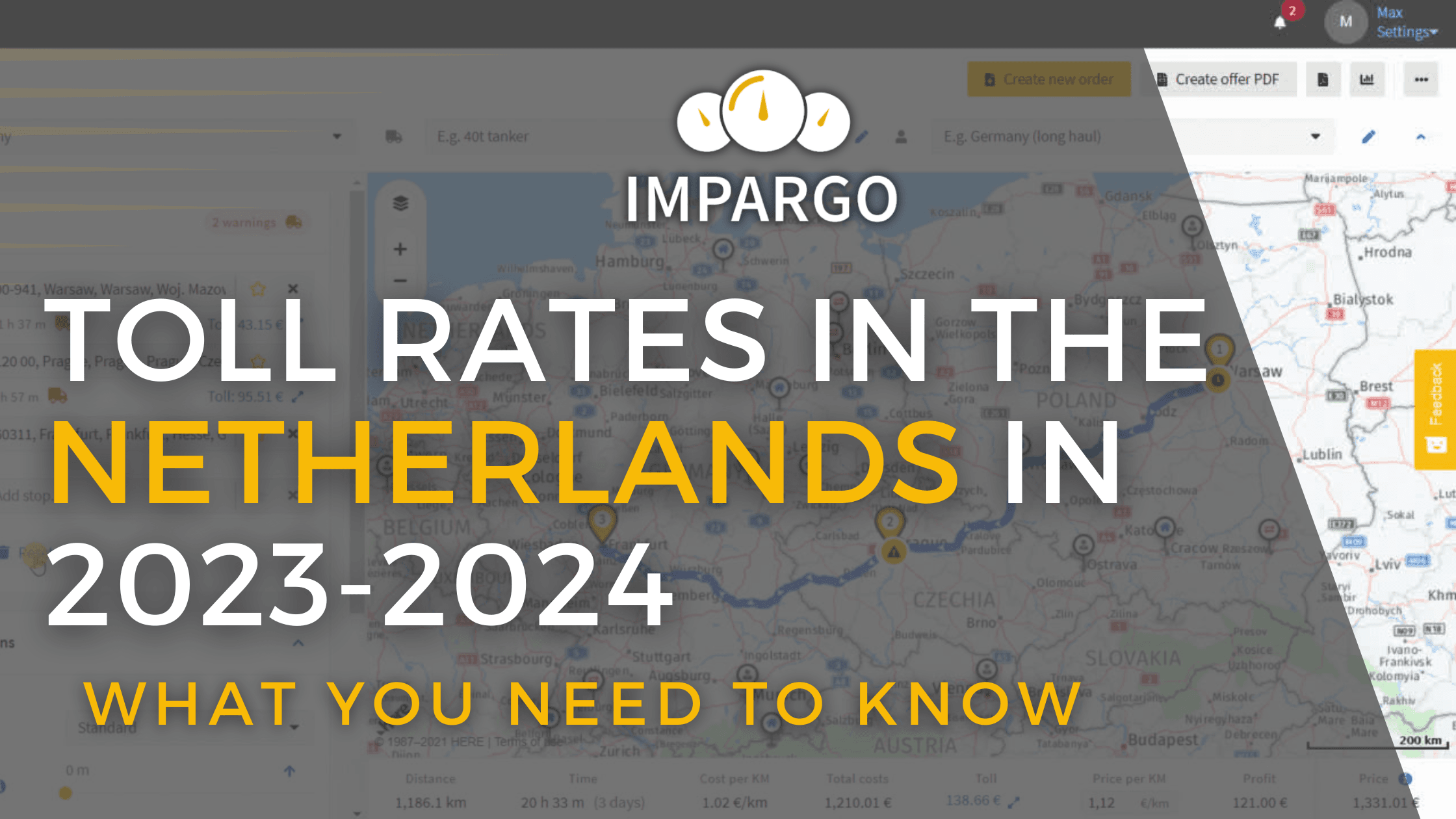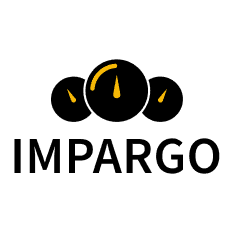
Introduction
Road freight transportation companies operating in the Netherlands, such as those involved in road freight logistics, play a vital role in the transport sector.
It is essential for these companies, as well as those in the freight transportation sector, to stay informed about the Dutch toll rates and regulations that affect their operations.
In this article, we will delve into the plans for the HGV (heavy goods vehicle) toll rates in the Netherlands for 2023-2024.
Understanding these Dutch toll rates is crucial for road freight companies to incorporate them into their transportation budgets and pricing strategies.
Let's explore the key details you need to know.
Table of Content
- Plans for HGV Toll Rates 2024
- Payment Methods and Compliance for HGV Toll in the Netherlands
- Having a TMS can help Manage HGV Toll Costs
- Which Roads will have HGV Toll in the Netherlands?
- Exceptions to HGV Toll in the Netherlands
- Environmental Features and Toll Rates in the Netherlands
- The Context of HGV Tolls in Europe
Plans for HGV Toll Rates 2024
The Dutch Cabinet intends to introduce a heavy goods vehicle toll for national and international freight traffic in the Netherlands by 2024.
These plans, which are of particular interest to freight transportation companies in the Netherlands, are currently awaiting parliamentary approval.
The toll will apply to both domestic and foreign trucks weighing over 3500 kg, impacting road freight in the Netherlands.
The specific toll rates for HGVs in the Netherlands have yet to be established. However, road freight companies in the Netherlands can expect these rates to be determined based on EU guidelines for road pricing.
In the context of impact studies, the reference rates for charging per kilometer have been established based on the average rates observed in Germany and Belgium, which amount to EUR 0.15.
The revenue generated by the HGV toll in the Netherlands will be allocated to the transport sector, potentially resulting in lower vehicle taxes for trucks.
Road freight companies can also anticipate that this revenue will be utilized to optimize the logistics chain, including green logistics initiatives, and promote sustainability and innovation within the transport sector.
Payment Methods and Compliance for HGV Toll in the Netherlands
HGV toll payment in the Netherlands will be like Belgium and Germany, heavy goods vehicles will be charged using a device called an on-board unit, or OBU (TelePass). These units will be provided by service providers.
The Dutch government wants to take advantage of existing on-board units used in other countries. By using the same OBU, drivers can travel through multiple countries.
The OBU will stay connected to a satellite system during the journey. This connection will determine the distance traveled on toll roads and calculate the bill.
The charges for heavy goods vehicles will vary based on their environmental characteristics and weight. Vehicles that are cleaner or lighter will have lower charges.
The data stored in the on-board unit will be kept secure to protect the driver's privacy. The authorities will inspect both Dutch and foreign vehicles. Anyone who doesn't follow the rules will be fined.
Alternatively, video tolling is available for vehicles without an onboard unit. In this case, the license plate is registered, and an invoice is sent by mail.
It is crucial for road freight companies to factor the Dutch toll costs into their transportation budgets and pricing strategies and ensure prompt payment to avoid penalty fees that may impact their road freight costs.
Having a TMS can help Manage HGV Toll Costs
Using a transportation management system (TMS) like IMPARGO can help automate the process of calculating tolls in the Netherlands. Here are a few key benefits:
- Automatic toll detection: The IMPARGO TMS can automatically detect toll transactions using GPS.This removes the need for outdated methods and manual calculation.
- Centralized management: All vehicles, trips and toll transactions are managed centrally through the IMPARGO TMS dashboard. This makes invoicing and payments more organized.
- Real-time updates: The TMS receives real-time updates on toll rates and tariffs. This ensures you always have accurate toll costs factored into prices.
- Trip cost analysis: Trip data and toll costs can be downloaded from the IMPARGO TMS for analysis. This provides visibility to help optimize routes and lower transportation spending.
Which Roads will have HGV Toll in the Netherlands?
The HGV toll will have a wide scope, affecting road freight transportation companies throughout the Netherlands.
It will be in force on all motorways in the Netherlands, including those used by road freight companies for freight transportation.
Additionally, select regional and local roads may be subject to the toll if freight traffic diversion becomes significant.
This aspect is essential for road freight companies to consider when planning freight diversion routes to optimize their operations and manage potential toll costs.
Exceptions to HGV Toll in the Netherlands
Certain vehicles primarily intended for non-freight transport will be exempt from paying the HGV toll in the Netherlands.
Examples of exempt vehicles include:
Farming and forestry tractors
- Mobile cranes
- Buses
- Limited-speed motor vehicles
- Military vehicles
- Fire engines
- Refuse lorries.
However, road freight transportation companies need to ensure compliance with the Dutch toll regulations for their freight trucks and factor the toll costs into their transportation budgets.
Environmental Features and Toll Rates in the Netherlands
One of the key factors influencing the Dutch toll rates for HGVs is the environmental features of the trucks.
This approach aims to promote green logistics and sustainable transport in the Netherlands.
Trucks with cleaner environmental profiles will attract lower toll rates, while less environmentally friendly vehicles used by freight transportation companies will face higher toll charges.
It is crucial for road freight companies to consider the impact of these toll rates on their road freight costs and transportation budgets.
The Context of HGV Tolls in Europe
HGV tolls are not unique to the Netherlands. Several European countries, including Austria, Belgium, Germany, and Switzerland, have already implemented tolls for heavy goods vehicles.
These tolls are an integral part of road freight costs and freight transport regulations in Europe.
Additionally, toll roads in the Netherlands, including those used by road freight transportation companies, are managed by the Rijkswaterstaat, which is a part of the Dutch Ministry of Infrastructure and Water Management.
Conclusion
As road freight transportation companies operating in the Netherlands prepare for the implementation of HGV toll rates in 2024, it is crucial to understand the scope, exceptions, payment methods, and potential impact on road freight costs associated with these Dutch tolls.
Incorporating these toll rates into their transportation budgets and pricing strategies will enable road freight companies to effectively manage costs and ensure compliance with the regulations.
Additionally, the revenue generated from the tolls will contribute to optimizing the logistics chain, promoting green logistics and sustainable transport, and driving innovation within the Dutch transport sector.
Stay informed and plan ahead to successfully navigate the changing landscape of road freight transportation in the Netherlands, including freight diversion routes, green logistics initiatives, and sustainable freight transport practices.
Using the IMPARGO Transportation Management System (TMS), road freight management in the Netherlands and Europe has never been easier.

